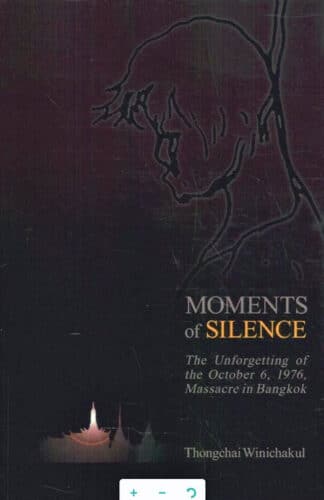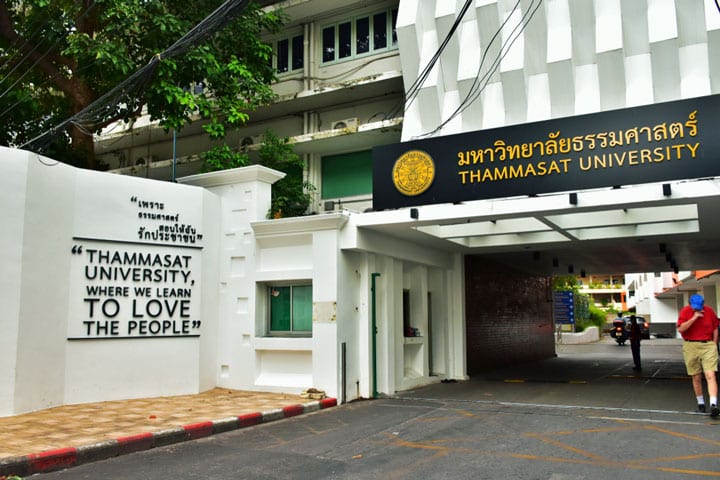
This study of how memories are processed has universal value, think of the Holocaust or the colonial past. The book made a deep impression on me, and sometimes led to very emotional reactions in me as well.
Short introduction
Thongchai was a 19-year-old student at Thammasat University and a member of the Student Council when, in the early morning of October 6, 1976, paramilitary units and police entered the university grounds and committed a massacre. Students were killed by bullets, hanged and possibly burned alive.
Thongchai experienced it very closely. He saw his friends killed. After the massacre, several thousand students were rounded up and imprisoned, beaten and abused by the police as inferior scum. Most were released after a few weeks, eighteen students were actually charged and appeared before a court in 1978. These students were eventually also released by the announcement of a general amnesty for all those involved. No one has ever been charged, prosecuted or punished on the government side.
Thongchai made a career as a historian after his studies. His most famous book is 'Siam Mapped', a book that discusses the creation of Thailand's modern borders and debunks the idea that Thailand was once a great empire that had to lose entire territories. In 1996, twenty years after the massacre, he and several others organized the first public memorial.
Below I share an abbreviated translation of the foreword from his book on the Thammasat University massacre. If you want to know more about the brutal events of October 6, 1976, click on the links below.
A few helpful resources
A short 5 minute video of Thongchai talking about what he experienced in '76:
https://www.youtube.com/watch?v=U1uvvsENsfw
More about October 6:
https://en.wikipedia.org/wiki/6_October_1976_massacre
Or here on Thailandblog:
https://www.thailandblog.nl/achtergrond/6-oktober-1976-massamoord-thammasaat-universiteit/
Thonchai's preface to Moments of Silence:
This book has been one of my life's missions. It is about an atrocity that took place in Bangkok on Wednesday morning, October 6, 1976. An event that Thailand has tried not to remember, but I cannot forget. Not a day has gone by since then that I didn't think about it. This book has taken too many years to complete. It was a shadow that has haunted me my entire career. (…)
As the years went by, my hopes for the truth and justice about the October 6 massacre faded, and the silence surrounding it worried me more and more. Thailand didn't seem to care about its past. People tried to bury it. Justice didn't matter. However, I believe that the silence over the massacre speaks loudly about Thai society in ways that go beyond the event itself: about truth and justice, how Thai society deals with conflict and its ugly past, about the ideas of reconciliation, the culture of impunity and rights, and about the rule of law in the country. All this made my will to write about October 6 all the more solid. (…)
In 1996, on the twentieth anniversary of the massacre, I initiated a commemoration. I wrote an article for that occasion. (…) To avoid seeming an excuse for my past, the article focused more on the memories of that event than what happened or who did what on that day. Many people encouraged me to turn the article into a book. (…)
In 2006 my ideas and research were largely organized but then Thailand plunged into a political crisis [coup]. My project was also affected by this as the former radicals of the 2010s played a role in the downward spiral of democracy. I put the book aside to see how the story of the former radicals would unfold. The unfinished manuscript lay idly on my desk for a while. Unfortunately, in Bangkok in 2016 there were more deaths and another massacre. I decided to retire in XNUMX to finish the book. (…)
My personal mission remains, I want to leave something in this world to preserve the memory of my fallen friends and to bring them the justice they deserve, no matter how long it takes. Part of me is still the political activist who organizes memorial activities, as I have done several times over the years. Another part of me is the historian who wants to leave a scholarly contribution in the hope that it will be taken off the shelf from time to time so that the massacre of October 6 remains known in the future. It is a privilege to erect a memorial to friends in the lasting form of a good book, something very close to my heart as a historian. (…)
The most difficult aspects [in writing this book] were personal and intellectual. I can't describe the emotional price in words and maybe that's why the project took so long. I didn't want to write a personal memoir, not with melancholy, not with a heroic feeling, not with guilt or revenge. As a historian, I just wanted to write a critical study of changing memories of this atrocity. That is difficult, because I was not an outsider, I experienced it all personally. I myself was the subject of the events I wanted to write about as a scholar. The solution was not only prudence and self-criticism, but choosing a middle ground between being a witness, a participant and a historian. Anyone who says this book isn't just academic, so be it. Part of my soul is in this book. Science and activism can go very well together. (…)
Despite the unusual approach due to the contradictions in the author's position, I nevertheless hope that readers will find this book serious and critical. They are a historian's thoughts on an event he himself witnessed and the memory changes he was part of. Writing this book has been a satisfying experience. I may never be completely satisfied with it because of the atrocity and the loss
of my friends is beyond my ability to express. But I am thankful that I was finally able to tell the world this story, one that should not be forgotten. I trust that the memory of the carnage will continue as long as this book is on a shelf somewhere in this world.
Thongchai
The book: Thongchai Winichakul, Moments of Silence, The Unforgetting of the October 6, 1976, Massacre in Bangkok (2020, Silkworm Books / University of Hawaiʻi Press)

Bangkok's Thammasat University in 2018 (Donlawath S / Shutterstock.com)


The violence must have been brutal if you read the comments here and there. Schrijver does not use the word 'killed' for nothing. And the worst part is, the ultras in Thailand are also today capable of violence such as beating up school children because they do not sing the daily song loud enough for country and frost….
Hope the book is in English. I have an account with Silkworm and then it will be in the Netherlands in 14 days.
It is written in English, the language of angels. I know of few books that are both very personal and very scientific.
Every country has its 'normative' history, history as it should be, in the eyes of the rulers usually to safeguard their own reputation and that of the country. The Golden Age and the colonial era are two Dutch examples. Sometimes there are adjustments.
In Thailand, this trend and its implementation is even stronger. Let me just mention the role of kings, from Sukhotai, through Ayutthaya to Bangkok. Let me quote myself:
These events and the massacres at Thammasaat University on October 6, 1976 are barely reflected in the historical debate in Thailand, and certainly not in school textbooks.
Where we Dutch always see our history against the background of the Revolt against Spain, the Constitution of Thorbecke and the Second World War, Thailand is denied that view of the past and Thailand cannot draw lessons from it for the present. Thai historiography has always been very selective; movements from below were hardly discussed.
'In Thailand, throughout history, there have been many individuals and movements that sought to improve the social, economic and political condition of the population. They have all been suppressed, interrupted, maligned and forgotten.”
The book is published in the Thailand region by Silkworm, the rest of the world by Hawaii Press. I (also) prefer to buy via Silkworm. The book is also available in digital e-reader format. It is certainly an emotional book that painfully evokes the “sand over it and we'll pretend nothing happened” reaction that followed almost all bloody violence and murders over the past century. Sometimes with the poor excuse that it is Buddhist... (no, it is "just" that the perpetrators are held over their heads, the victims are just "unethical" scum...)
I started reading the book. It is indeed appalling what happened then and the many questions that have never been answered. It is mainly a personal account of one of the victims of the atrocities. That's how I'm reading it.
However, I have serious doubts about the scientific content of the book. I was and am a great admirer of sociologists such as Max Weber and Norbert Elias. Both have convinced me that both involvement and distance are necessary for real scientific work. (A scientist cannot be an activist). Involvement ('emotion') in the subject of study is necessary, but also sufficient distance to test all kinds of theories and assumptions, including those that you are personally averse to.
Tongchai does not have that distance (partly according to the start of the book in which he tells about the attack on the students) and he cannot be blamed for that. He would have been better off writing the book as a memoir and asking a historian with some distance to write another book.